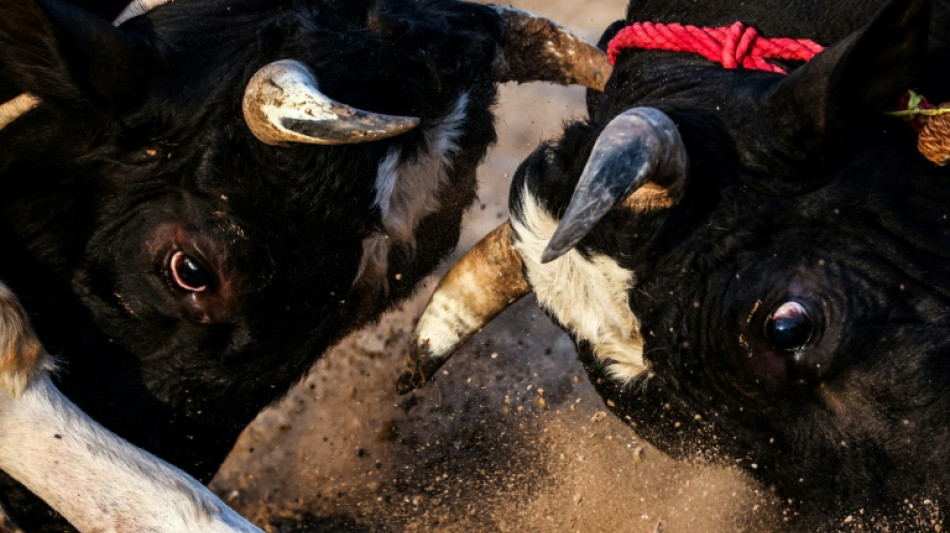
-
 Japan PM's tax giveaway roils markets and worries voters
Japan PM's tax giveaway roils markets and worries voters
-
Amid Ukraine war fallout, fearful Chechen women seek escape route

-
 Rybakina surges into Melbourne semis as Djokovic takes centre stage
Rybakina surges into Melbourne semis as Djokovic takes centre stage
-
Dollar struggles to recover from losses after Trump comments

-
 Greenland blues to Delhi red carpet: EU finds solace in India
Greenland blues to Delhi red carpet: EU finds solace in India
-
Will the EU ban social media for children in 2026?

-
 Netherlands faces 'test case' climate verdict over Caribbean island
Netherlands faces 'test case' climate verdict over Caribbean island
-
Rybakina stuns Swiatek to reach Australian Open semi-finals

-
 US ouster of Maduro nightmare scenario for Kim: N. Korean ex-diplomat
US ouster of Maduro nightmare scenario for Kim: N. Korean ex-diplomat
-
Svitolina credits mental health break for reaching Melbourne semis

-
 Japan's Olympic ice icons inspire new skating generation
Japan's Olympic ice icons inspire new skating generation
-
Safe nowhere: massacre at Mexico football field sows despair

-
 North Korea to soon unveil 'next-stage' nuclear plans, Kim says
North Korea to soon unveil 'next-stage' nuclear plans, Kim says
-
French ex-senator found guilty of drugging lawmaker

-
 US Fed set to pause rate cuts as it defies Trump pressure
US Fed set to pause rate cuts as it defies Trump pressure
-
Sleeping with one eye open: Venezuelans reel from US strikes

-
 Venezuela's acting president says US unfreezing sanctioned funds
Venezuela's acting president says US unfreezing sanctioned funds
-
KPop Demon Hunters star to open Women's Asian Cup

-
 Trump warns of 'bad things' if Republicans lose midterms
Trump warns of 'bad things' if Republicans lose midterms
-
Russian strikes in Ukraine kill 12, target passenger train

-
 With Maduro gone, Venezuelan opposition figure gets back to work
With Maduro gone, Venezuelan opposition figure gets back to work
-
Celebrities call for action against US immigration raids

-
 Rubio to warn Venezuela leader of Maduro's fate if defiant
Rubio to warn Venezuela leader of Maduro's fate if defiant
-
Denver QB Nix 'predisposed' to ankle injury says coach

-
 Lula, Macron push for stronger UN to face Trump 'Board of Peace'
Lula, Macron push for stronger UN to face Trump 'Board of Peace'
-
Prass stunner helps Hoffenheim go third, Leipzig held at Pauli

-
 Swiss Meillard wins final giant slalom before Olympics
Swiss Meillard wins final giant slalom before Olympics
-
CERN chief upbeat on funding for new particle collider

-
 Trump warns US to end support for Iraq if Maliki returns
Trump warns US to end support for Iraq if Maliki returns
-
Judge reopens sexual assault case against goth rocker Marilyn Manson

-
 South Korea's ex-first lady to learn verdict in corruption case
South Korea's ex-first lady to learn verdict in corruption case
-
Rosenior dismisses Chelsea exit for 'untouchable' Palmer

-
 Markram powers South Africa to win over West Indies
Markram powers South Africa to win over West Indies
-
Vladimir Padrino: Venezuela's military power broker

-
 Amazon closing Fresh and Go stores in Whole Foods push
Amazon closing Fresh and Go stores in Whole Foods push
-
Koepka nervous about game and fans in PGA Tour return

-
 Trump's Iowa trip on economy overshadowed by immigration row
Trump's Iowa trip on economy overshadowed by immigration row
-
Dortmund coach says Inter Milan are improved under Chivu

-
 US border chief in Minneapolis as Trump tries to calm crisis
US border chief in Minneapolis as Trump tries to calm crisis
-
What to know about America's colossal winter storm

-
 Iran warns against 'instability' after US strike group arrives
Iran warns against 'instability' after US strike group arrives
-
GM reports quarterly loss but boosts shareholder returns

-
 US banks fight crypto's push into Main Street
US banks fight crypto's push into Main Street
-
NFL Bills make offensive coordinator Brady new head coach

-
 TikTok settles hours before landmark social media addiction trial
TikTok settles hours before landmark social media addiction trial
-
Newcastle braced for 'ultimate test' against PSG after storm disruption

-
 Brook blitz ends Sri Lanka's unbeaten home run, England clinch series
Brook blitz ends Sri Lanka's unbeaten home run, England clinch series
-
LVMH 2025 net profit drops 13% to 10.9 bn euros

-
 Philip Glass pulls Kennedy Center premiere after Trump takeover
Philip Glass pulls Kennedy Center premiere after Trump takeover
-
Slot says Liverpool must fix 'very bad cocktail'


Little-known bullfighting tradition lives on in UAE village
Far from Dubai's gleaming skyscrapers and renowned camel races, a bullfight is under way in the emirate of Fujairah, where the tradition continues unbeknown to most in the United Arab Emirates.
"Look at them fight!" a commentator shouts into a microphone as the first bovine battle of the day kicks off, sending up clouds of dust in the village of Al-Qurayyah.
Two bulls, each weighing in at hundreds of kilograms (pounds), charge at each other while assistants hold ropes attached to their necks or legs for safety.
Sometimes the huge animals come dangerously close to the spectators, sending them fleeing from their chairs.
About 200 men, women and children are gathered in a large field to watch, with children perched on the roofs of 4X4 vehicles and pick-ups.
Trucks carrying bulls have converged from all over the region on the arena, a dirt field wedged between rocky mountains and the Gulf of Oman.
About 50 of the beasts are scattered around, and their bellowing echoes across the area.
"There are no rules," explained Issa, 34, whose family owns a nearby farm and has been involved in bullfighting for decades.
"The winner is the one that shows the most courage and doesn't run away," added the man whose nephews stream the bouts on TikTok and Instagram.
In the better-known emirates of Abu Dhabi and Dubai, camel beauty contests and races are popular, but "here it is the bullfights", said Majid, 36, whose animal scored a draw in the fight.
- Cruel and abusive? -
Unlike the bullfights popular in Spain and Mexico, where the animals are typically slain by matadors, in Fujairah two beasts go head-to-head with far less fatal consequences.
The competition typically ends after about an hour, with each fight lasting just one or two minutes.
Animal welfare groups have however denounced the sport as cruel and abusive.
Elsayed Mohamed, the regional director of the International Fund for Animal Welfare, argued that just because something has been part of a society for so long does not make it right.
"Every culture has many bad traditions, but because it's a tradition, we have to follow?" he asked, noting that animal fights are prohibited under UAE law.
Those who promote the fights, he said, argue that "it is 'not a bloody' competition... comparing these fights to the ones in Spain that end with the killing of the animal.
"Even if they are taking precautions to prevent any harm, wounds will happen," said Mohamed.
Standing in the audience at the recent bullfight event was a German tourist couple who had learnt about it in an "alternative tourist guide book".
"We thought it would be interesting to see that -- it's unusual for us," said Gunter Beelitz, who works in theatre.
"This is a bit like the fights in Spain except that here it is just one bull against one bull and not a man," he said. "And the bull doesn't die. We don't like the Spanish bullfights."
- Family tradition -
The bulls were once imported from South Asia for agricultural work, but the emergence of new technologies has rendered them obsolete to farming.
Issa's family breed the animals or buy them for between 5,000 and 40,000 dirhams (about $1,360 to $10,900).
With help from a number of farm employees he readied about 17 beasts to fight every Friday after prayers.
He said he has been preparing bulls for battle since he was "just a child".
"We go to the animals, we check if they are okay... we take their temperatures and we feed them," he said.
He rolled up his sleeves and dipped his arm into a large pot of bovine powerfood -- a boiled mixture of wheat, dates, herbs and fish.
"This is what gives the bulls their strength," said Issa, clad in a traditional Emirati "kandoura", an ankle-length shirt.
Issa and his family said they have no intention of ending the pastime that has been passed down from generation to generation.
"People did not have much to do, and they would get the animals and get them to fight, a form of entertainment," said Issa.
"It would bring people together," he continued, adding that he plans to pass the practice down to his six children.
J.Horn--BTB

